|
|
|
Sort Order |
|
|
|
Items / Page
|
|
|
|
|
|
|
| Srl | Item |
| 1 |
ID:
174839
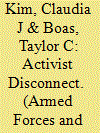

|
|
|
|
|
| Summary/Abstract |
Do activists seeking to challenge the U.S. military presence overseas succeed in persuading the local population? While the comparative literature on base contestation often makes implicit causal claims about public opinion and behavior, these claims have never been tested empirically using individual-level data. Based on an online survey, experiment with residents of communities hosting U.S. military bases in Korea and Japan, we demonstrate a disconnect between anti-base movements and local residents. Local public opinion is most responsive to pragmatic framing of opposition by social movements and tangible information about the consequences of base expansion. Other common activist tactics have little effect and may even backfire. Our findings fill an important gap in the growing literature on the politics of U.S. military bases abroad.
|
|
|
|
|
|
|
|
|
|
|
|
|
|
|
|
| 2 |
ID:
163711
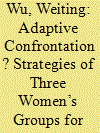

|
|
|
|
|
| Summary/Abstract |
An absence of overt contention has led scholars to question the existence of social movements in China and to agree with the “state corporatism” description of state–social group relations there. This article presents the idea of “adaptive confrontation” to demonstrate that there are women’s and lesbian groups in China that go beyond the idea of state corporatism, as well as to challenge current applications of social movement theories and better understand state–social group relationships in a repressive regime.
|
|
|
|
|
|
|
|
|
|
|
|
|
|
|
|
| 3 |
ID:
132006
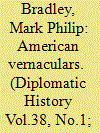

|
|
|
|
|
| Publication |
2014.
|
| Summary/Abstract |
On a wintry January evening in 1973, the members of Amnesty International USA Group 11 gathered on the Upper East Side of New York City to adopt a new prisoner of conscience, Sutanti Adit of Indonesia. Adit, a medical doctor and the wife of the leader of the Indonesian Communist Party, had been arrested and imprisoned in the ruthless campaigns of repression that followed a failed 1965 coup against the Sukarno government, which had ruled Indonesia since its formal independence from Dutch colonial control in 1950. She was among more than a hundred thousand Indonesians arrested, interrogated (often under torture), and imprisoned by the state. As many as fifty thousand of them remained in custody for more than a decade housed in prison camps whose sanitation, medical facilities, and food were inadequate at best. They were permitted very limited contact with the outside world, including family and friends, and harshly mistreated by prison guards.1
|
|
|
|
|
|
|
|
|
|
|
|
|
|
|
|
| 4 |
ID:
153720
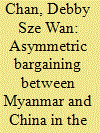

|
|
|
|
|
| Summary/Abstract |
The Myitsone Dam suspension is an asymmetric negotiation between Naypyitaw and Beijing. The bilateral agreement of the hydropower project was concluded in 2009. However, Myanmar's civil society started to oppose the dam when political opportunities expanded in 2011. The quasi-civilian government in Myanmar was caught in an ‘audience cost dilemma': either to disappoint domestic constituents by fulfilling international obligations, or to compensate the Chinese dam developer for breaching the contract. In September 2011, Myanmar President Thein Sein declared the suspension of the dam throughout his tenure. Unexpectedly, China's state-owned dam company did not sue Naypyidaw. Moreover, Beijing even engaged with societal actors in Myanmar to seek their support for the project. How could Naypyitaw defy Beijing in this Myitsone Dam case? Drawing from 35 interviews with anti-dam campaigners and other stakeholders, as well as secondary data, this article argues that the rise of civil society successfully conditioned Naypyitaw's diplomatic options in the controversy. The change of Beijing's diplomatic strategy confirms that domestic constraint in Myanmar is not rhetorical. The Myitsone Dam case is an example that shows bilateral agreement without domestic endorsement can become China's business risk. Presumably, the dispute has wider implications for other Chinese overseas projects outside Myanmar.
|
|
|
|
|
|
|
|
|
|
|
|
|
|
|
|
| 5 |
ID:
106019
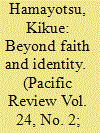

|
|
|
|
|
| Publication |
2011.
|
| Summary/Abstract |
There is a prevailing assumption amongst scholars and observers of Indonesian politics that there is a close link between religious identity and political identity. How valid is this socio-cultural identity model in explaining the party affiliation and political allegiance of increasingly pious Muslim youth to a political organization in the context of democratic consolidation? In particular, how valid is this assumption with consideration to contemporary Indonesian politics? This article engages this debate through a careful analysis of the member recruitment and mobilization of the most successful religious-based Islamist organization in post-authoritarian Indonesia, the Prosperous Justice Party (PKS). The article combines two strands of social movement theory, resource mobilization and opportunity structures, to argue that the PKS's relative success in recruiting committed Muslim youth is explained by two interrelated factors: (1) merit-based cadre recruitment and promotion, which offers young, ambitious and religiously conscious Muslim youth fair and institutionalized political career opportunities and thus incentives to commit themselves to the party's collective interests; and (2) the timing of organizational expansion that coincided with a rapid increase of state office - both executive and legislative - at the sub-national levels as a result of localized democratic elections.
|
|
|
|
|
|
|
|
|
|
|
|
|
|
|
|
| 6 |
ID:
069829
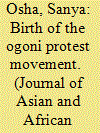

|
|
|
| 7 |
ID:
114647
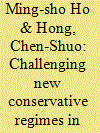

|
|
|
|
|
| Publication |
2012.
|
| Summary/Abstract |
This article compares anti-American beef politics in South Korea (2008) and
Taiwan (2009) to solve the puzzle of why two similar social protests resulted in
dissimilar outcomes. Given the highly comparable political contexts of conservative
ascendancy, we argue that cultural factors determined the movement trajectories.
The presence of anti-Americanism and the centrality of beef in the national diet
produced a strong anti-government movement in Korea but not in Taiwan.
|
|
|
|
|
|
|
|
|
|
|
|
|
|
|
|
| 8 |
ID:
121130
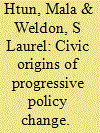

|
|
|
|
|
| Publication |
2012.
|
| Summary/Abstract |
Over the past four decades, violence against women (VAW) has come to be seen as a violation of human rights and an important concern for social policy. Yet government action remains uneven. Some countries have adopted comprehensive policies to combat VAW, whereas others have been slow to address the problem. Using an original dataset of social movements and VAW policies in 70 countries over four decades, we show that feminist mobilization in civil society-not intra-legislative political phenomena such as leftist parties or women in government or economic factors like national wealth-accounts for variation in policy development. In addition, we demonstrate that autonomous movements produce an enduring impact on VAW policy through the institutionalization of feminist ideas in international norms. This study brings national and global civil society into large-n explanations of social policy, arguing that analysis of civil society in general-and of social movements in particular-is critical to understanding progressive social policy change.
|
|
|
|
|
|
|
|
|
|
|
|
|
|
|
|
| 9 |
ID:
078325
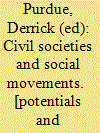

|
|
|
|
|
| Publication |
London, Routledge, 2007.
|
| Description |
xiii, 233p.
|
| Standard Number |
0415399335
|
|
|
|
|
|
|
|
|
|
|
|
Copies: C:1/I:0,R:0,Q:0
Circulation
| Accession# | Call# | Current Location | Status | Policy | Location |
| 052510 | 303.484/PUR 052510 | Main | On Shelf | General | |
|
|
|
|
| 10 |
ID:
132273
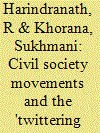

|
|
|
|
|
| Publication |
2014.
|
| Summary/Abstract |
Using Partha Chatterjee's insights on the formation of 'civil society' and how this is distinct from 'political society', this paper theorises the mobilisation of popular support via social media during the so-called 'anti-corruption movement' in India in 2011. It tracks the main themes of the civil society-led movement's Twitter feeds during two crucial phases of fasting by its self-proclaimed Gandhian leader, Anna Hazare. This highlights the mixing of nostalgic pre-independence discourses with new media savvy and provides a means of contextualising what such discursive mobilisation means for contemporary political formations in a post-colonial society such as India. The case study also sheds light on the urban- and middle-class-centred nature of the protest and its preference for media over electoral representation-this is in line with Chatterjee's conceptualisation of a civil society that undermines the authority of the state and excludes the rural and urban poor.
|
|
|
|
|
|
|
|
|
|
|
|
|
|
|
|
| 11 |
ID:
109788
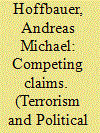

|
|
|
|
|
| Publication |
2011.
|
| Summary/Abstract |
Drawing on social movement and media literature, this article examines what factors influence coverage of the Corsican nationalist movement in Western European news coverage. A content analysis of 317 newspaper and magazine articles shows that representations and standing of the movement's claims is contingent on prevailing French politics. Contrary to expectations of the dominant literature, violence does not increase media attention.
|
|
|
|
|
|
|
|
|
|
|
|
|
|
|
|
| 12 |
ID:
047141
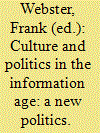

|
|
|
|
|
| Publication |
London, Routledge, 2001.
|
| Description |
xiii, 231p.
|
| Standard Number |
0415246369
|
|
|
|
|
|
|
|
|
|
|
|
Copies: C:1/I:0,R:0,Q:0
Circulation
| Accession# | Call# | Current Location | Status | Policy | Location |
| 044647 | 303.4833/WEB 044647 | Main | On Shelf | General | |
|
|
|
|
| 13 |
ID:
020929
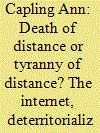

|
|
|
|
|
| Publication |
2001.
|
| Description |
443-466
|
|
|
|
|
|
|
|
|
|
|
|
|
|
|
|
| 14 |
ID:
122111
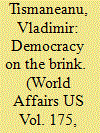

|
|
|
|
|
| Publication |
2013.
|
| Summary/Abstract |
Twenty-three years after the bloody uprising that freed it from the grip of the Ceausescu dictatorship, Romania seemed to have become a consolidated democracy, boasting membership in NATO and the European Union. Then came the summer of 2012, when the southeastern European country, already a cause of concern to Western Europe because of reports of creeping lawlessness and political corruption, tried on a more authoritarian political identity, as a second Belarus or a second Venezuela. Officials in the EU and US winced and unequivocally called upon the new Romanian government to abide by its commitments.
|
|
|
|
|
|
|
|
|
|
|
|
|
|
|
|
| 15 |
ID:
170375
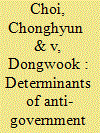

|
|
|
|
|
| Summary/Abstract |
What determines cross-national variations in the extent of anti-government protests in Asia? Anti-government protests have surged across Asia in recent years, with many contributing to consequential political change. However, systematic cross-national comparison of the determinants of protests in Asia is still largely missing. This article fills this important gap by quantitatively examining the explanatory power of the three main theories of contentious politics—grievance, resource mobilization, and political process theories—in the Asian context with new data on anti-government protests in all 25 Asian states from 1990 to 2016. The analysis finds that urbanization, information and communication technology, and regional demonstration effects are the strong catalysts of anti-government protests in Asia, while repressive state capacity particularly dampens protests. The findings offer important insights into the dynamics of the anti-government protests that have become increasingly salient in Asian politics.
|
|
|
|
|
|
|
|
|
|
|
|
|
|
|
|
| 16 |
ID:
131647
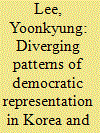

|
|
|
|
|
| Publication |
2014.
|
| Summary/Abstract |
This paper explains the difference between Korea's vocal movements and feeble parties versus Taiwan's stable parties and dependent movements from the political dynamics formed under the authoritarian state. Taiwan's party-based authoritarianism provided ground for party development but not for independent social movements. Korea's personal dictatorship was inimical to party development but engendered a contentious movement sector.
|
|
|
|
|
|
|
|
|
|
|
|
|
|
|
|
| 17 |
ID:
130999


|
|
|
|
|
| Publication |
2014.
|
| Summary/Abstract |
We examine the degree to which national political setting, namely domestic political opportunity structures, influences the transnational activities of women's groups in the United Kingdom, France, and Germany. The literature suggests that social groups are more likely to choose international activity when national institutions provide fewer opportunities for domestic activity (Keck and Sikkink 1998; della Porta and Tarrow 2005). Using data about women's groups' activity from a content analysis of news wires from 1980 to 2008, we conclude that women's groups act in the domestic sphere significantly more than they act in the international arena-even when acting on transnational issues-and that groups choose international action when domestic opportunities are less hospitable to group action. Thus, we argue that the domestic sphere continues to be a major influence on social movement activity even as globalization and transnationalism increase.
|
|
|
|
|
|
|
|
|
|
|
|
|
|
|
|
| 18 |
ID:
133034
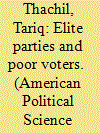

|
|
|
|
|
| Publication |
2014.
|
| Summary/Abstract |
Why do poor people often vote against their material interests? This article extends the study of this global paradox to the non-Western world by considering how it manifests within India, the world's biggest democracy. Arguments derived from studies of advanced democracies (such as values voting) or of poor polities (such as patronage and ethnic appeals) fail to explain this important phenomenon. Instead, I outline a novel strategy predicated on an electoral division of labor enabling elite parties to recruit the poor while retaining the rich. Recruitment is outsourced to nonparty affiliates that provide basic services to appeal to poor communities. Such outsourcing permits the party to maintain programmatic linkages to its elite core. Empirically, I test this argument with qualitative and quantitative evidence, including a survey of more than 9,000 voters. Theoretically, I argue that this approach is best suited to elite parties with thick organizations, typically those linked to religious social movements
|
|
|
|
|
|
|
|
|
|
|
|
|
|
|
|
| 19 |
ID:
079958
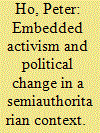

|
|
|
|
|
| Publication |
2007.
|
| Summary/Abstract |
This article provides a theoretical introduction to the other contributions in this special issue. The emergence of social movements is generally seen as an indicator of democratization. The article argues that such a view overlooks the nature of political change in China, which entails a more gradual transition. In this light, the collection of articles is organized around several questions. What does the limited political space imply for the development of a social movement in China? Is the possibility for a social movement a precondition for the development of civil society? What are the prospects for the emergence of a social movement in China, and how would it relate to international forces? These questions are explored by focusing on one of the most active areas of civil society in contemporary China: the environmental realm. The argument linking the articles in this special issue is that China's semiauthoritarian political setup in association with increased social spaces for civic action has created a milieu for embeddedness in social movement. Contrary to totalitarian control, the semiauthoritarian environment is restrictive, but paradoxically, it is also conducive to nationwide, voluntary collective action
|
|
|
|
|
|
|
|
|
|
|
|
|
|
|
|
| 20 |
ID:
132957
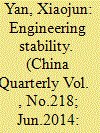

|
|
|
|
|
| Publication |
2014.
|
| Summary/Abstract |
Given their critical influence on society and politics, university students are one of the key target groups for authoritarian political control around the world. To further our understanding of the endurance and resilience of authoritarianism in post-Deng China, it is necessary to examine one of the Party-state's most crucial control frameworks: the institutional mechanism through which it preserves social stability in the nation's 2,358 university campuses, and maintains control over its more than 22 million college students. Drawing upon intensive field research conducted in 2011, this article attempts to map out the structures and measures deployed by the post-Deng regime to nurture political compliance and consolidate its domination of university campuses. By deciphering an essential component of the state's political control apparatus, this article aims to shed new light on the internal operations of the authoritarian system that is running China today.
|
|
|
|
|
|
|
|
|
|
|
|
|
|
|
|
|
|
|
|
|